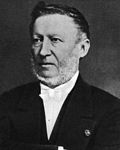| ||||||||||||||||||||||||||||||||||
69 of the 138 seats in the Chamber of Representatives 70 seats needed for a majority | ||||||||||||||||||||||||||||||||||
|---|---|---|---|---|---|---|---|---|---|---|---|---|---|---|---|---|---|---|---|---|---|---|---|---|---|---|---|---|---|---|---|---|---|---|
| ||||||||||||||||||||||||||||||||||
| ||||||||||||||||||||||||||||||||||
 |
|---|
|
|
Partial general elections were held in Belgium on 13 June 1882.[1][2] The result was a victory for the Liberal Party, which won 79 of the 138 seats in the Chamber of Representatives and 37 of the 69 seats in the Senate.[2] Voter turnout was 75.1%, although only 55,517 people were eligible to vote.
Under the alternating system, elections for the Chamber of Representatives were only held in four out of the nine provinces: Hainaut, Limburg, Liège and East Flanders. Special elections were also held in the arrondissements of Antwerp, Philippeville, Brussels, Nivelles and Namur.
Run-off elections were held a week later, on 20 June 1882.
A special election was also held in Liège on 16 October 1882 following the death of Dieudonné Mouton on 17 September.

